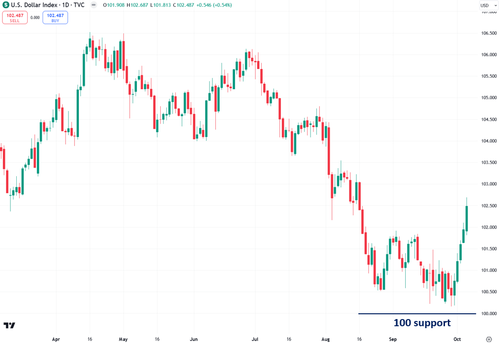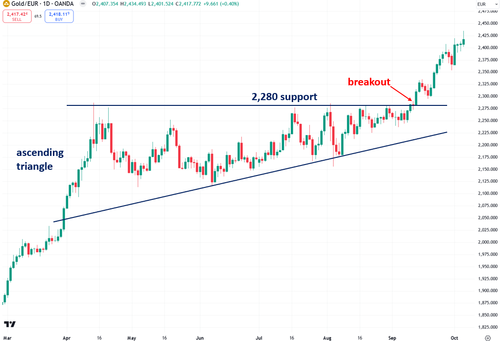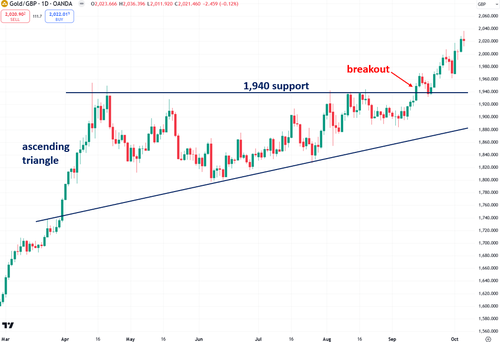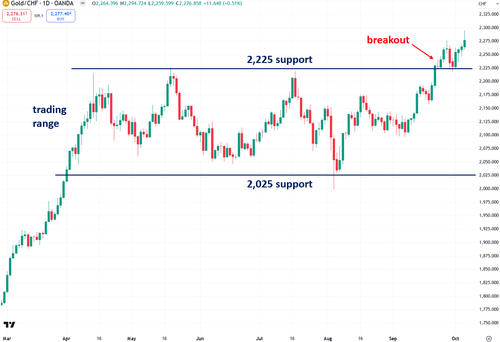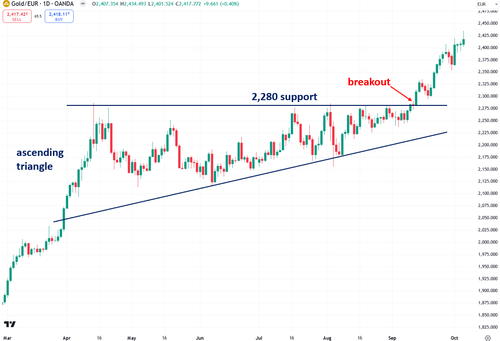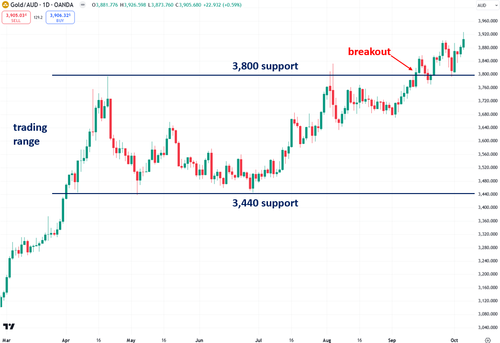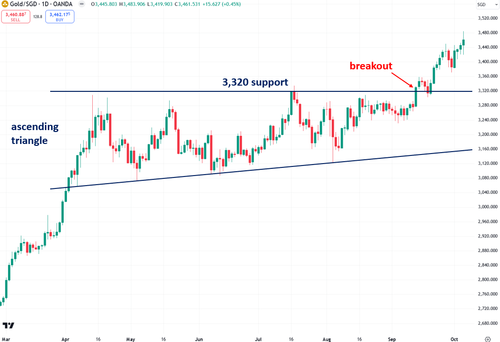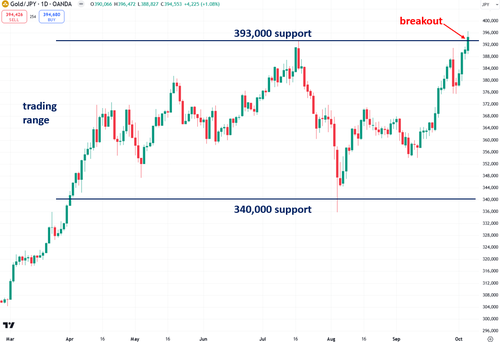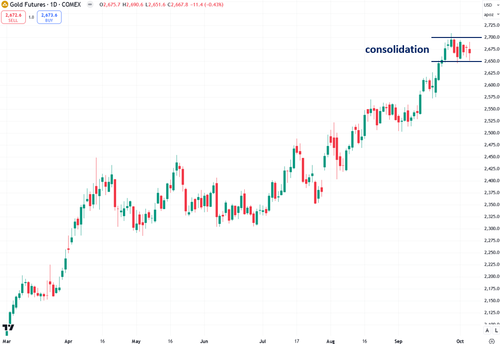
By Jesse Colombo, author of the Bubble Bubble Report
I wanted to share an interesting observation about gold’s behavior this past week. As I anticipated, gold priced in U.S. dollars has paused its rally, consolidating as it works off its overbought condition. Fortunately, it hasn't experienced the deeper pullback that some had feared, reinforcing the resilience of this ongoing bull market. What's particularly notable is that gold's pause is driven almost entirely by the rebound in the U.S. dollar, rather than any intrinsic weakness in gold itself. In fact, gold continues to rally when priced in most non-U.S. currencies, as I'll demonstrate in this piece.
The chart below shows COMEX gold futures, which are priced in U.S. dollars. Over the past week, gold futures have been consolidating within a $50 range, between $2,650 and $2,700. This is a healthy behavior in a bull market, as gold takes a breather before its likely next move higher. A decisive breakout above the key $2,700 level will signal the next leg up. Additionally, I've observed that each dip in gold continues to be met with buying, further signaling underlying strength.
Gold's pause over the past week was largely driven by the surging U.S. dollar, which benefited from flight-to-safety capital flows following Iran's launch of over 180 ballistic missiles toward Israel and Friday’s stronger-than-expected U.S. jobs report, which showed that 254,000 jobs were added in September. Gold and the U.S. dollar typically move inversely, meaning a stronger dollar usually puts downward pressure on gold, and vice versa. However, despite the dollar's recent surge, gold has managed to hold its ground, which is a clear sign of resilience.
What’s especially noteworthy, however, is that gold’s rally remains strong and uninterrupted when priced in most non-U.S. currencies. I find it valuable to monitor gold priced in non-U.S. currencies because it removes the influence of dollar weakness or strength and shows whether gold is actually strong in its own right. For example, gold continues to hit fresh all-time highs when priced in euros:
Gold’s rally continues unabated when priced in British pounds:
Gold priced in Swiss francs recently broke out and is hitting new all-time highs. Switzerland is an important center for the international gold industry, making this breakout especially significant, as I recently detailed in an article.
The chart below shows gold priced in euros, British pounds, and Swiss francs. I find that this particular mix shows gold's movements very clearly. As you can see, gold’s rally continues smoothly without any interruptions. I recently used gold priced in this basket of currencies to project a run to at least $3,000 during this bull market — a target that’s quite reasonable, considering it represents only a 13% gain from current levels.
Gold priced in Australian dollars recently broke out and hit an all-time high on Friday. Australia is one of the world’s leading gold exporters, and its Perth Mint is renowned as one of the most popular producers of gold bullion products globally.
Gold priced in Singapore dollars has continued to show strong performance following its breakout a few weeks ago. This is an important development because Singapore is a regional gold trading hub and is expected to become even more influential in the gold arena in the years ahead.
After nearly six months of wide-ranging fluctuations, driven by volatility in the Japanese yen, gold priced in yen has finally experienced a breakout. I’ve seen many people suggest that gold's bull market is overextended and due for a sharp correction, but I strongly disagree. Gold is just beginning to break out in non-U.S. currencies, with the yen being a perfect example of this emerging strength.
In light of these observations, it’s clear that while gold has paused in U.S. dollar terms, its strength in non-U.S. currencies reflects the ongoing momentum of this bull market. Gold’s resilience against the backdrop of a surging dollar and global economic uncertainty highlights its solid foundation. As we see breakouts across major currencies like the yen, euro, and Swiss franc, it becomes evident that the broader bull market for gold is far from over. This multi-currency perspective reinforces the view that gold still has room to run, with significant upside potential ahead.
If you enjoyed this article, please visit Jesse's Substack for more content like this...
By Jesse Colombo, author of the Bubble Bubble Report
I wanted to share an interesting observation about gold’s behavior this past week. As I anticipated, gold priced in U.S. dollars has paused its rally, consolidating as it works off its overbought condition. Fortunately, it hasn’t experienced the deeper pullback that some had feared, reinforcing the resilience of this ongoing bull market. What’s particularly notable is that gold’s pause is driven almost entirely by the rebound in the U.S. dollar, rather than any intrinsic weakness in gold itself. In fact, gold continues to rally when priced in most non-U.S. currencies, as I’ll demonstrate in this piece.
The chart below shows COMEX gold futures, which are priced in U.S. dollars. Over the past week, gold futures have been consolidating within a $50 range, between $2,650 and $2,700. This is a healthy behavior in a bull market, as gold takes a breather before its likely next move higher. A decisive breakout above the key $2,700 level will signal the next leg up. Additionally, I’ve observed that each dip in gold continues to be met with buying, further signaling underlying strength.
Gold’s pause over the past week was largely driven by the surging U.S. dollar, which benefited from flight-to-safety capital flows following Iran’s launch of over 180 ballistic missiles toward Israel and Friday’s stronger-than-expected U.S. jobs report, which showed that 254,000 jobs were added in September. Gold and the U.S. dollar typically move inversely, meaning a stronger dollar usually puts downward pressure on gold, and vice versa. However, despite the dollar’s recent surge, gold has managed to hold its ground, which is a clear sign of resilience.
What’s especially noteworthy, however, is that gold’s rally remains strong and uninterrupted when priced in most non-U.S. currencies. I find it valuable to monitor gold priced in non-U.S. currencies because it removes the influence of dollar weakness or strength and shows whether gold is actually strong in its own right. For example, gold continues to hit fresh all-time highs when priced in euros:
Gold’s rally continues unabated when priced in British pounds:
Gold priced in Swiss francs recently broke out and is hitting new all-time highs. Switzerland is an important center for the international gold industry, making this breakout especially significant, as I recently detailed in an article.
The chart below shows gold priced in euros, British pounds, and Swiss francs. I find that this particular mix shows gold’s movements very clearly. As you can see, gold’s rally continues smoothly without any interruptions. I recently used gold priced in this basket of currencies to project a run to at least $3,000 during this bull market — a target that’s quite reasonable, considering it represents only a 13% gain from current levels.
Gold priced in Australian dollars recently broke out and hit an all-time high on Friday. Australia is one of the world’s leading gold exporters, and its Perth Mint is renowned as one of the most popular producers of gold bullion products globally.
Gold priced in Singapore dollars has continued to show strong performance following its breakout a few weeks ago. This is an important development because Singapore is a regional gold trading hub and is expected to become even more influential in the gold arena in the years ahead.
After nearly six months of wide-ranging fluctuations, driven by volatility in the Japanese yen, gold priced in yen has finally experienced a breakout. I’ve seen many people suggest that gold’s bull market is overextended and due for a sharp correction, but I strongly disagree. Gold is just beginning to break out in non-U.S. currencies, with the yen being a perfect example of this emerging strength.
In light of these observations, it’s clear that while gold has paused in U.S. dollar terms, its strength in non-U.S. currencies reflects the ongoing momentum of this bull market. Gold’s resilience against the backdrop of a surging dollar and global economic uncertainty highlights its solid foundation. As we see breakouts across major currencies like the yen, euro, and Swiss franc, it becomes evident that the broader bull market for gold is far from over. This multi-currency perspective reinforces the view that gold still has room to run, with significant upside potential ahead.
If you enjoyed this article, please visit Jesse’s Substack for more content like this…
Loading…
